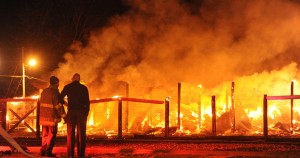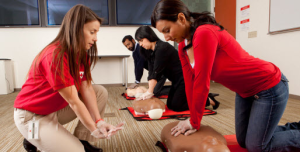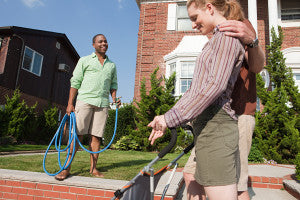[caption id="attachment_21614" align="alignright" width="300"]

Wildfire in Mississippi - photo by The Clarion Ledger[/caption]
Wildfire season started fast and early. This year, 2.1 million acres have already burned,
according to the National Interagency Fire Center. The 10-year average is 312,726, or about 1/7 of this year’s total.
Most of the wildfires have been in drought-stricken parts of Texas, Oklahoma, Kansas, and Colorado. More than a million acres had burned in those four states by March 7, thousands of people were evacuated, and seven died,
according to CNN.
A Kansas wildfire was the largest in the state’s history, the
New York Times said. More than three-quarters of one county was charred.
“This is our Hurricane Katrina,” an agriculture extension agent with Kansas State University told the
New York Times.
Ranchers, farmers, and others all over the country
have stepped up, donating money,
hay,
cattle,
fences, and
time to help rebuild.
One reason to be prepared for an emergency is so you can help others. Here are some ways to do so.
Learn Something

Do you know first aid?
The American Red Cross offers first aid certification and online classes in first aid, CPR and other skills.
Check out this list of jobs in disaster cleanup from the
Houston Chronicle. Can you perform any of them? If not, you might have other skills that could be useful during a disaster. Some farmers, for example, helped fight a fire in eastern Colorado by
plowing firebreaks ahead of the fire.
Know what you’re doing before you rush in. After an earthquake in Mexico City, volunteers rescued 800 people. But 100 volunteers died in the process, according to the Federal Emergency Management Agency’s Community Emergency Response Team (CERT) site.
If you’re a danger around a hammer, consider another skill. Do you know how to use
Facebook or set up a
GoFundMe account? People who do have been sharing information about the fires and how to help.
Facebook has a feature,
Safety Check, that invites people who might be in an area affected by a disaster to mark that they’re safe. In February, Facebook added a Community Help feature so when people mark themselves safe, they get sent to a page where they can get assistance or volunteer to help others.
Become a CERT volunteer. CERT programs train normal people for a disaster so they can safely help friends and neighbors before first responders arrive then help first responders prioritize resources.
Toss an extra item or two into your emergency supplies. Especially consider adding cleaning supplies, including gloves, masks, and bleach. Smoke, ash, soot, and water damaged buildings in wildfires’ paths. To help clean buildings that weren’t destroyed, the United Methodist Community of Relief
sent eight pallets of cleaning supplies to northeastern Colorado.
Most important, know your neighbors. Ready.gov recommends you take the following steps in your community before a disaster.
 Talk to your neighbors
Talk to your neighbors about how you can
work together during an emergency.
Replace out if anyone has specialized equipment like a power generator, or expertise such as medical knowledge, that might help in a crisis.
Decide who will
check on elderly or disabled neighbors.
Make back-up plans for children in case you can't get home in an emergency.
Sharing plans and
communicating in advance is a good strategy.
In addition, FEMA’s Listen, Protect and Connect brochure teaches ways to provide psychological first aid to those who are dealing with a disaster or other life-changing event.

 Wildfire in Mississippi - photo by The Clarion Ledger[/caption]
Wildfire season started fast and early. This year, 2.1 million acres have already burned, according to the National Interagency Fire Center. The 10-year average is 312,726, or about 1/7 of this year’s total.
Most of the wildfires have been in drought-stricken parts of Texas, Oklahoma, Kansas, and Colorado. More than a million acres had burned in those four states by March 7, thousands of people were evacuated, and seven died, according to CNN.
A Kansas wildfire was the largest in the state’s history, the New York Times said. More than three-quarters of one county was charred.
“This is our Hurricane Katrina,” an agriculture extension agent with Kansas State University told the New York Times.
Ranchers, farmers, and others all over the country have stepped up, donating money, hay, cattle, fences, and time to help rebuild.
One reason to be prepared for an emergency is so you can help others. Here are some ways to do so.
Learn Something
Wildfire in Mississippi - photo by The Clarion Ledger[/caption]
Wildfire season started fast and early. This year, 2.1 million acres have already burned, according to the National Interagency Fire Center. The 10-year average is 312,726, or about 1/7 of this year’s total.
Most of the wildfires have been in drought-stricken parts of Texas, Oklahoma, Kansas, and Colorado. More than a million acres had burned in those four states by March 7, thousands of people were evacuated, and seven died, according to CNN.
A Kansas wildfire was the largest in the state’s history, the New York Times said. More than three-quarters of one county was charred.
“This is our Hurricane Katrina,” an agriculture extension agent with Kansas State University told the New York Times.
Ranchers, farmers, and others all over the country have stepped up, donating money, hay, cattle, fences, and time to help rebuild.
One reason to be prepared for an emergency is so you can help others. Here are some ways to do so.
Learn Something
 Do you know first aid? The American Red Cross offers first aid certification and online classes in first aid, CPR and other skills.
Check out this list of jobs in disaster cleanup from the Houston Chronicle. Can you perform any of them? If not, you might have other skills that could be useful during a disaster. Some farmers, for example, helped fight a fire in eastern Colorado by plowing firebreaks ahead of the fire.
Know what you’re doing before you rush in. After an earthquake in Mexico City, volunteers rescued 800 people. But 100 volunteers died in the process, according to the Federal Emergency Management Agency’s Community Emergency Response Team (CERT) site.
If you’re a danger around a hammer, consider another skill. Do you know how to use Facebook or set up a GoFundMe account? People who do have been sharing information about the fires and how to help.
Facebook has a feature, Safety Check, that invites people who might be in an area affected by a disaster to mark that they’re safe. In February, Facebook added a Community Help feature so when people mark themselves safe, they get sent to a page where they can get assistance or volunteer to help others.
Become a CERT volunteer. CERT programs train normal people for a disaster so they can safely help friends and neighbors before first responders arrive then help first responders prioritize resources.
Toss an extra item or two into your emergency supplies. Especially consider adding cleaning supplies, including gloves, masks, and bleach. Smoke, ash, soot, and water damaged buildings in wildfires’ paths. To help clean buildings that weren’t destroyed, the United Methodist Community of Relief sent eight pallets of cleaning supplies to northeastern Colorado.
Most important, know your neighbors. Ready.gov recommends you take the following steps in your community before a disaster.
Do you know first aid? The American Red Cross offers first aid certification and online classes in first aid, CPR and other skills.
Check out this list of jobs in disaster cleanup from the Houston Chronicle. Can you perform any of them? If not, you might have other skills that could be useful during a disaster. Some farmers, for example, helped fight a fire in eastern Colorado by plowing firebreaks ahead of the fire.
Know what you’re doing before you rush in. After an earthquake in Mexico City, volunteers rescued 800 people. But 100 volunteers died in the process, according to the Federal Emergency Management Agency’s Community Emergency Response Team (CERT) site.
If you’re a danger around a hammer, consider another skill. Do you know how to use Facebook or set up a GoFundMe account? People who do have been sharing information about the fires and how to help.
Facebook has a feature, Safety Check, that invites people who might be in an area affected by a disaster to mark that they’re safe. In February, Facebook added a Community Help feature so when people mark themselves safe, they get sent to a page where they can get assistance or volunteer to help others.
Become a CERT volunteer. CERT programs train normal people for a disaster so they can safely help friends and neighbors before first responders arrive then help first responders prioritize resources.
Toss an extra item or two into your emergency supplies. Especially consider adding cleaning supplies, including gloves, masks, and bleach. Smoke, ash, soot, and water damaged buildings in wildfires’ paths. To help clean buildings that weren’t destroyed, the United Methodist Community of Relief sent eight pallets of cleaning supplies to northeastern Colorado.
Most important, know your neighbors. Ready.gov recommends you take the following steps in your community before a disaster.
 Talk to your neighbors about how you can work together during an emergency.
Replace out if anyone has specialized equipment like a power generator, or expertise such as medical knowledge, that might help in a crisis.
Decide who will check on elderly or disabled neighbors.
Make back-up plans for children in case you can't get home in an emergency.
Sharing plans and communicating in advance is a good strategy.
In addition, FEMA’s Listen, Protect and Connect brochure teaches ways to provide psychological first aid to those who are dealing with a disaster or other life-changing event.
Talk to your neighbors about how you can work together during an emergency.
Replace out if anyone has specialized equipment like a power generator, or expertise such as medical knowledge, that might help in a crisis.
Decide who will check on elderly or disabled neighbors.
Make back-up plans for children in case you can't get home in an emergency.
Sharing plans and communicating in advance is a good strategy.
In addition, FEMA’s Listen, Protect and Connect brochure teaches ways to provide psychological first aid to those who are dealing with a disaster or other life-changing event.


